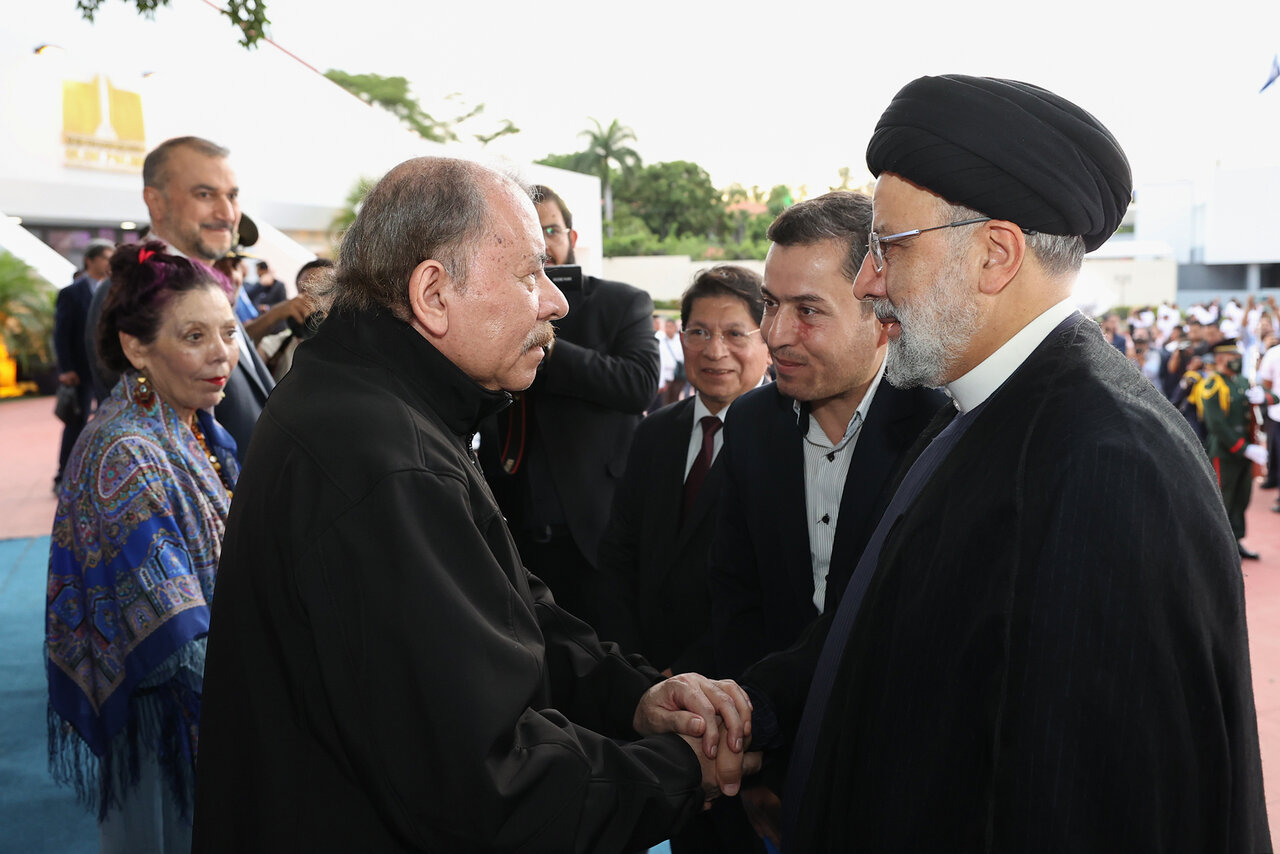Iranian nation seizing chance of sanctions, threats: Raisi
Ortega declares a minute of silence in honor of General Soleimani

TEHRAN- After a two-day visit to Venezuela, Iranian President Ebrahim Raisi arrived in Managua, Nicaragua’s capital, on Tuesday evening local time at the invitation of his Nicaraguan counterpart on the second leg of his three-nation tour of Latin America and will set off for Cuba later.
Raisi is accompanied by a group that includes the ministers of foreign affairs, oil, defense, and health on his five-day trip.
Iran has extensive links with various Latin American countries across a variety of fields and aspires to deepen such ties.
Addressing a meeting of Venezuelan elites and academics at the Teresa Carreno Theater in Caracas on Tuesday at the end of his two-day official visit to Venezuela, President Raisi talked about current geopolitics and the new world order’s viewpoints.
In his address, Raisi stated that faith in God and confidence in the country’s own resources are the two requirements for the success of a nation.
“Some individuals think that if we kneel down, the adversary will submit or retreat,” he pointed out.
The president continued by saying that the media industry and the subject of human rights are some of the instruments and tactics used by the current unjust global system to advance its objectives.
“The Americans are the first violators of human rights, but they condemn others while doing so,” Raisi said, adding, “The discovery of dead bodies in Canada is one of the manifestations of efforts by the global arrogance to undermine human rights.”
Raisi also held a meeting with the president and a number of officials of the National Assembly of Venezuela in Caracas on Tuesday.
Upon arrival in Managua, President Raisi was officially and warmly welcomed by his Nicaraguan counterpart, Daniel Ortega.
Hailing Iran and Nicaragua’s strategic connections, their common stances against arrogance, and their mutual principles in support of independence and freedom, Raisi expressed Tehran’s willingness to expand cooperation with Managua in a variety of spheres.
Raisi also praised national heroes of the battle against imperialism in both nations.
“The Islamic Republic of Iran is a democratic system, and in the 44 years that have passed since the victory of the Islamic Revolution, people’s vote has shaped all the institutions of the Islamic Republic,” said the Iranian president, referring to the Nicaraguan people’s resistance to colonizers and hegemons.
He said that relationships between Iran and Nicaragua are “strategic” and that Iran is prepared to deepen these ties in all spheres, particularly in science and technology.
In response to Westerners’ exaggerated claims of democracy and regard for human rights, Raisi said that “Westerners, especially Americans, should respect the systems that emerge from people’s votes, but they are doing the opposite.”
“America wanted to stop our nation with sanctions and threats, but our nation not only did not stop, but instead it used the threats and sanctions to build and progress,” he averred.
Raisi also made a reference to the U.S. policies that helped create the Daesh terrorist group, saying, “They claim fight against terrorism, but they martyred the hero of the fight against terrorism, Haj Qassem Soleimani.”
Lt. Gen. Soleimani was a legendary commander in the fight against terrorists, especially Daesh. He was assassinated in a U.S. drone strike near Baghdad’s international airport on January 3, 2020.
Ortega, for his part, referred to the simultaneity of the revolutions of Iran and Nicaragua, as thrilling and said, “The revolutions of the two countries had strong roots in fighting domination, especially the United States, which has always sought to impose its will on others.”
Hegemony is a feature of imperialism, the president of Nicaragua said, adding, “The arrogant put pressure on independent countries under the pretext of human rights and democracy, but we will stand against them with strength.”
He also paid tribute to the national heroes of the two nations, denounced the assassination of Lt. Gen. Soleimani by the U.S., and called for a moment of silence in memory of the Iranian hero against terrorism.
Disregard for unilateralism is Tehran-Managua common policy: FM
Following President Raisi’s visit to Nicaragua, Iranian Foreign Minister Hossein Amir Abdollahian stated that both Iran and the Latin American country had a negation of unilateralism.
In a post on his Twitter account on Wednesday, the foreign minister, who is touring Latin America with Raisi, highlighted the significance of the visit to Nicaragua.
“The positive history of political solidarity between Iran and Nicaragua in the international organizations could spread to the promotion of bilateral cooperation as well,” Amir Abdollahian noted.
Iran’s top diplomat remarked that “the defiance of unilateralism is the common section of the policy of the two countries.”
Additionally, he noted that the Iranian administration’s “balanced foreign policy” pays special attention to the capacities of Latin America.
Abdollahian stressed that Tehran and Managua’s excellent records of political unity and solidarity in international institutions can pave the way for hastening the growth of bilateral cooperation.
